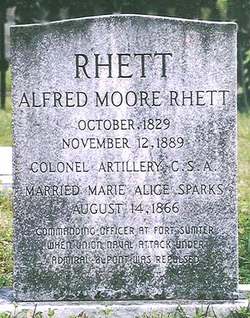Colonel Alfred Moore Rhett
Alfred Moore Rhett was born in 1829 in Beaufort, South Carolina. His father was Robert Rhett, the secessionist fire-eater. Alfred was a Harvard graduate and planter before the Civil War began. He began the war as a 1st lieutenant in the 1st South Carolina Artillery. By March of 1862, he'd been promoted to major. Rhett was an extremely arrogant man.
The commander of the 1st South Carolina Artillery was Colonel William Ransom Calhoun, the nephew of John C. Calhoun the "father of secession". Colonel Calhoun was born in 1827 in Charleston, South Carolina. He was a graduate of the United States Military Academy, served briefly in the U.S. Army before also becoming a planter. Prior to the trouble between himself and Major Rhett, Calhoun fought at the battles of Second Manassas and Secessionville.
The trouble between the two officers seems to have begun in April of 1861 around the time of the shelling of Fort Sumter. It appears that Rhett thought Calhoun an inferior officer to himself and often denounced him in public. He resented Calhoun's military education and thought he was better suited for colonel. He'd already fought two duels with a friend of Colonel Calhoun who had overheard him making offensive remarks about the colonel. Neither man had been injured in these two duels.
It appears that Rhett had been drinking when the final insult occurred. It was reported that Rhett called Calhoun a "puppy", but most likely he called him a part of a woman's anatomy that was not used in every day language of that time. Calhoun challenged Rhett to a duel. In both previous duels, Rhett had let the other party fire first and after having been missed, he fired his pistol into the air. Legend has it that Calhoun was so fed up with Rhett, that he made it a rule that neither party was to fire into the air.
It was called one of the fairest duels ever fought by the Richmond Daily Dispatch. There were three state senators, the South Carolina speaker of the house, a civilian, and an army captain present for the duel. Major Rhett preferred the "drop" shot (where the pistols are pointed toward the sky when the order to fire is given), but Colonel Calhoun preferred to shoot on the "rise" (where the pistols are pointed toward the ground at one's side before the order is given). Discussions were held and Calhoun won. It seems that Major Rhett took the time to write out a formal protest before stepping out to duel.
Another view of Alfred Moore Rhett
Calhoun was dressed in civilian clothing as he had been away from the army because of ill health. Rhett was dressed in his major uniform. When the order to fire was given, Rhett fired just a half second after Calhoun. Calhoun missed and the bullet from Rhett's pistol struck Calhoun in the body. He survived for about an hour.
Major Rhett was arrested for dueling, but Beauregard soon pardoned him and promoted him to colonel of the 1st South Carolina Artillery. Rhett briefly commanded Fort Sumter. He would serve in Charleston until 1865 when he retreated into North Carolina where he was captured at the Battle of Averasboro. A Federal soldier called Rhett a "devil in human shape". He was held at Fort Delaware until July 24, 1865.

Tombstone of Alfred Moore Rhett
Rhett served as police chief of Charleston, South Carolina following the war and died on November 12, 1889. Ironically, both men were buried in Magnolia Cemetery in Charleston, where they rest today.


If we can believe what we read, dueling was an 'honorable' aspect of expressing one's manhood, but I wonder at that concept. Interesting story, though.
ReplyDelete